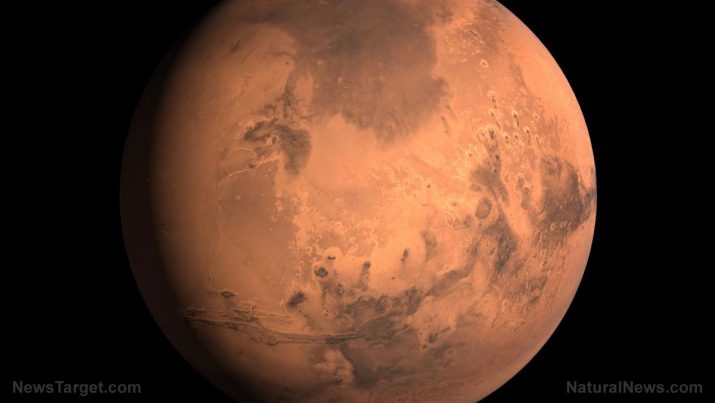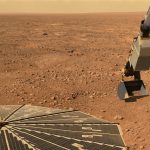
Mars discovery almost certainly proves life exists on other planets
Monday, June 11, 2018 by JD Heyes
http://www.ufos.news/2018-06-11-mars-discovery-almost-certainly-proves-life-exists-on-other-planets.html

The age-old mystery, “Are we alone in the galaxy?” is now closer than ever before to being solved.
The answer is: Probably not.
In the last few days, Fox News reported a “massive” discovery regarding Mars: The Curiosity rover put there by NASA found organic molecules on the ‘red planet.’
“We found organic molecules in rocks from an ancient lake bed,” said Jen Eigenbrode, research scientist at Goddard Flight Center in Goddard, Md., at a press conference simultaneously held at NASA’s Jet Propulsion Laboratory in Pasadena, Calif. A variety of molecules were identified, she noted further.
According to the space agency, the rocks are billions of years old. And, while scientists painstakingly attempted to explain that “life” had not been found on Mars, organic molecules could not have existed in a vacuum. Organic suggests ‘life form.’
What’s more, scientists explained that the molecules they discovered could provide additional clues as to what they belong to.
“Organic compounds are fundamental to our search for life,” said Paul Mahaffy, director of the Solar System Exploration Division at Goddard.
Fox News noted further:
Described as the most technologically advanced rover ever built, Curiosity launched on Nov. 26, 2011. The rover landed on Mars’ Gale Crate on Aug. 6, 2012, with the goal of determining whether Mars was ever able to support microbial life.
Eigenbrode told reporters that the organic molecules “could have come from things that are non-biological,” but that’s a technical explanation — something she has to say because NASA doesn’t have the body of something to show the world.
But a definition of “organic” notes that it is “of, relating to, or arising in a bodily organ … of, relating to, or derived from living organisms.”
And, other scientists noted, the molecules were discovered because researchers were specifically looking for signs of life on the planet. (Related: Multiple UFO sightings near the ISS lead some people to believe we’re being watched by aliens.)
“All life that we know of is based on organic molecules,” said Eigenbrode. “There’s a whole suite of chemical and physical things that we could measure to find signatures of life.”
Other signs of alien life
The Curiosity rover has already made interesting life-related discoveries on the red planet. For instance, in 2013 it found a rock sample showing that ancient Mars could have supported living microbes. And, in 2014, the rover measured a tenfold spike in methane, which is an organic byproduct, in the atmosphere surrounding it. And, at that time, the probe detected additional organic molecules in a sample of rock and power collected by its drill.
Scientists confirmed Thursday that the rover is providing them with additional details surrounding Mars’ methane-laced atmosphere. The machine has discovered “a repeatable, identifiable pattern in the methane measurement,” Chris Webster, a senior research fellow at NASA’s Jet Propulsion Lab, told reporters. He added that this could be “key to unlocking the mysteries associated with Mars methane.”
Other indications that ‘we’re not alone’ have been revealed recently as well.
As The National Sentinel reports, a once-secret report written by the Pentagon in 2009 contained details of contact between carrier-based U.S. Navy F/A-18s and an unidentified flying object off the coast of California in 2004.
The planes, flying from the USS Nimitz, were in contact with the craft repeatedly over a two-week period in November of that year.
The report noted that pilots witnessed a “tic-tac” shaped object that could travel at “ballistic missile” speeds and then immediately stop to hover.
Radar operators aboard the Nimitz and one of its escort ships, the USS Princeton, were able to track the object, but they were never able to ‘lock on’ to it (meaning they could never have targeted the object).
It’s not “proof” of alien life but it’s the closest thing to it. Kind of like discovering “organic molecules” on a nearby planet.
Read more about space-related discoveries at Space.news.
J.D. Heyes is also editor-in-chief of The National Sentinel.
Sources include:
Tagged Under: Tags: alien life form, aliens, astrobiology, Curiosity Rover, discoveries, discovery, Mars, Microbiology, NASA, organic life, outer space, real science, space exploration, UFO, Unexplained





